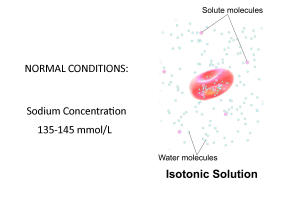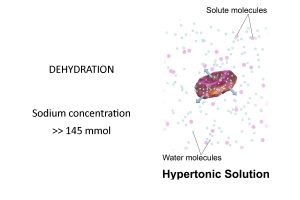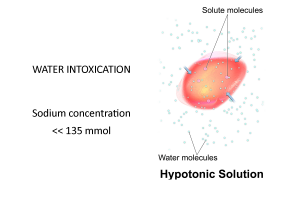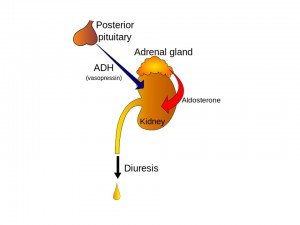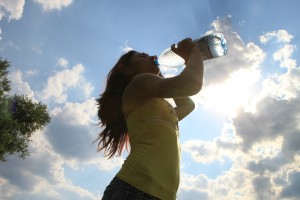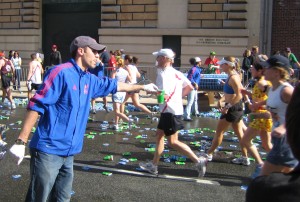Your heart health in a heartbeat _ Episode 3
TRANSCRIPT:
Hello Everyone,
Today I’d like to talk about a topic that has nothing to do with heart disease, but one which I think should be of interest to athletes and to people who do intense exercise and sports. The topic is “water intoxication.”
I bring that up because a young man came to Athletic Heart SF just the other day to be evaluated. He had had really bad symptoms during an intense workout, and there was a concern it might be his heart, but we figured out that the most likely cause of his symptoms was water intoxication.
So what do we mean by water intoxication? Why and how does it happen during exercise? What are the symptoms? And what can we do to prevent it? These are the questions I will address now.
So first, what is water intoxication? Water intoxication occurs when you drink so much water and you drink it so fast that you overwhelm the ability of the kidneys to get rid of excess water. As a result, your blood and body fluids become too dilute. This is called hyponatremia, which refers to the fact the concentration of sodium falls as the blood becomes dilute. In fact, the technical term for water intoxication in the setting of exercise is called “exercise-associated hyponatremia” or EAH, but here I will simply use the term water intoxication.
The reason this is a problem is because the dilution of the blood affects the movement of water in and out of the cells of the body. Normally, the blood concentration of sodium must be kept between 135 and 145 mmol/L, because at that level, the blood and body fluids are isotonic with the cells of the body.
If you get dehydrated, the concentration of sodium rises above 145, and the cells of the body shrink because water moves out of the cell under osmotic pressure.
On the other hand, if the sodium concentration drops much below 135 because you have been drinking too much water, then the cells of the body can swell as shown here, because water will move from the blood stream into the cells due to osmotic pressure.
And we maintain our sodium concentration in that range primarily through our sense of thirst which lets us know that we should be drinking more or less, and there is also a hormonal system that works on the kidneys to tell them to hang on to or excrete more water or less water depending on the situation.
And that system of thirst, kidneys and hormones is really quite robust, so that water intoxication is really quite rare, and only happens under extreme circumstances, but nevertheless, it can happen, and it can happen in particular to athletes and to anyone who engages in intense exercise activities.
Why does water intoxication happen in athletes?
Part of the reason water intoxication is associated with physical exercise is because over the last few years athletes have been encouraged—and some would say over-encouraged—to drink water and fluids to avoid dehydration or heat stroke.
Sometimes people get the advice to drink water even before the onset of thirst, which is probably not a good advice. And plenty of water is made available at sporting events, which is good, of course, to avoid dehydration, but it can also be a temptation to drink mechanically.
Some people also may believe that drinking will prevent or treat muscle cramps, and so they may drink more than they need to on that basis.

Photo credit: “Bishop Loughlin Games – Armory – Track & Field (11609407975)” by Steven Pisano. Licensed under CC BY 2.0 via Commons –
It is important to know that there is no good evidence that cramps can be avoided or treated by drinking water, even water containing electrolytes, such as Gatorade and other sports drinks. As a matter of fact, it is important to know that even sports drinks like Gatorade and the like do not have a high concentration of sodium compared to the blood, so one can get water intoxication from overdrinking sports drinks as well, not just water.
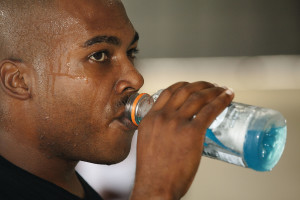
“USMC-101029-M-2339L-087” by Lance Cpl. Reece E. Lodder – Licensed under Public Domain via Wikimedia Commons –
What are the symptoms of water intoxication?
The symptoms of water intoxication occur because, as I mentioned earlier, the cells of the body start to swell, and in particular, the cells in the brain, the neurons, may be affected. At first, when the intoxication is mild, you may feel light-headedness, dizziness, or nausea. Now unfortunately these symptoms are not very specific and they can be symptoms of other conditions, such as heart symptoms and they can also be symptoms of dehydration. In fact, some people may mistake the symptoms of water intoxication for dehydration and drink more, which will make the situation even worse.
And as things get more severe, then the symptoms can proceed to vomiting, headache, confusion, disorientation and sadly, even collapse and death, and there have been several reported cases of death from water intoxication over the years, which is a real shame, because it is of course completely avoidable.
In what kinds of sports settings does water intoxication occur?
The settings in which water intoxication is most commonly described are long endurance competitions and events, usually those lasting more than 4 hours: marathons, ultramarathons, triathlons, rowing, but also hiking, military exercises, police training, etc. But in truth, though, water intoxication can really occur to anyone who drinks more than their body needs and faster than the kidneys can get rid of the excess water. If you just sat there and began to drink gallons of water rapidly, you could get water intoxication, even you did not do any exercise.
Now having said all of this, I don’t want you to be too worried about your water intake and trying to exactly match your intake to your losses. The body is quite forgiving, and serious water intoxication is unfortunately rare, but nevertheless if we are not thoughtful about it, we can get in trouble, and we can avoid the problem simply with common sense.
What can we do to prevent water intoxication?
The main approach to prevention is to be mindful of how much we drink and to pay attention to what our nature has provided for us, namely our thirst mechanism. It turns out that our thirst mechanism is a very reliable guide for our water intake. So don’t “push fluids” and over drink ahead of your run or exercise, or drink more than is reasonable and don’t drink just to treat or avoid muscle cramps. Also be mindful of how much you drink during exercise. Don’t mechanically grab water cups at each filling station just because they are there. Also, if you start to experience symptoms of lightheadedness or nausea, don’t assume it is because you are dehydrated. In a situation like this it is best to stop, collect yourself, determine whether you are thirsty or not and, if the symptoms are very significant, seek medical attention.
In summary, water intoxication is a rare but potentially severe problem that can confront those who exercise. The main cause is from drinking too much irrespective of thirst. The early symptoms are lightheadedness and nausea, but if these are ignored water intoxication can progress to cause confusion, collapse, and even death. The main prevention is to drink as guided by thirst and common sense.
I hope you have found this brief video useful. As always you will find the transcripts on the blog of Athletic Heart SF, and if you have any question you would like me to address on future episodes, please feel free to drop me a note. Until next time, enjoy working out and be well!

